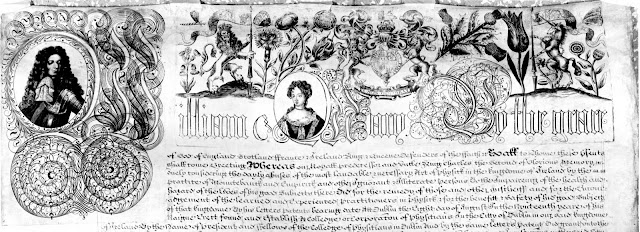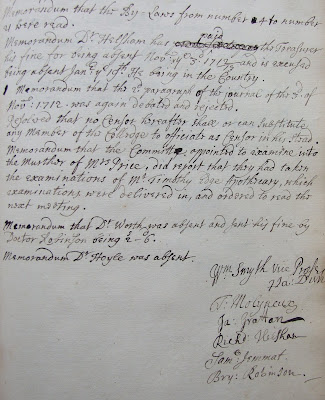Sir Patrick Dun and the College of Physicians
On this day, April 20th, 300 years ago Sir Patrick Dun attended his last meeting of, what was then, the King and Queen's College of Physicians in Ireland. Dun had been a member of the College for over 30 years and in all that time had missed attending only 28 meetings. His record of service to the College is unparalleled; between 1681 and 1707 he was President of the College 13 times, a record which has never been surpassed, he was also Censor of the College on five occasions. (While not wishing to detract from Dun's record is should be noted that in his day the College had only 14 Fellows to pick the Censors and President from).
Aside from Dr Stearne who founded the College, Dun was probably the most influential of the early Presidents of the College. His attendance record and time in office show a high level of commitment to College activities, and he was able to use his Royal influence to gain the second Royal Charter for the College in 1692. The College's letter petitioning for a new charter stated that the powers granted them in the early charter of 1667 had
'since been found insufficient to compass the noble design, partly for want of power to correct and reform some abuses that have since crept in, or have been lately discovered, and partly because the power and jurisdiction granted by the said Charter did not extend farther than 7 miles from the city of Dublin, so that your petitioners could not reform the inconveniences and abuses in the rest of the Kingdom, whereby the number of unskilful and illiterate practisers of physic had increased, and the frauds and deceits of empirics, apothecaries, and druggists do abound to the dishonour of the government, and the loss and destruction of their Majesties good subjects in the Kingdom'.
As well as this noble design, to improve the quality of medical care in Ireland, the College had another reason for wanting to receive a new Charter; to remove the influence of Trinity College in their affairs. Under the 1667 Charter, Trinity had the power to approve the appointment of the President of the College of Physicians. This was not a problem until 1687, when the College of Physicians proposed appointing Dr John Crosby as President; Crosby had been a Fellow since 1674 but was also a Catholic. Unusually Trinity refused to confirm the appointment, although they sighted administrative irregularity as the reason, the real cause seems to have been Crosby's Catholicism.
 |
| Royal Charter of the King and Queen's College of Physicians of Ireland, 1692 |
When King William and Queen Mary granted the new Royal Charter in 1692 it did extend the power of the College of Physicians, although possibly not as much as they had hoped. However, granted in the wake of the 'Glorious Revolution' and the Williamite Wars, it included a clause that all Fellows and Officers of the College were required to take the 'oaths, and subscribe to the declarations contained in an Act lately made in the Parliament of England'. This required the taker to deny the supremacy of the Pope, as well as Catholic doctrines including transubstantiation. As a result Catholics like Dr Crosby could no longer even be a Fellow of the College, let alone President. The 1692 Charter names only 7 of the 14 Fellows to run the College, those names are the Protestant Fellows in place before the Charter was granted, the Catholic Fellows were removed. Despite the religious disqualifications, which were standard at the time, Dun's influence had been successful in gaining a new Charter for the College and additional powers; his importance is recognised in the Charter where he is named as the first President of the new established King and Queen's College of Physicians.
 |
| College minutes from April 20th 1713 |
But what of Dun's last college meeting? The treasurer, Dr Helsham, presented his accounts, and then collected Dr Worth's fine of 2 shillings and 6 pence (in the region of €300 in today's money) for failing to attend a College meeting. There was then discussion of changes to the College's bye-laws and the appointment of College officials. The final item of discussion is perhaps the most intriguing;
'Memorandum that the Committee appointed to examine into the murther [an archaic word for murder] of Mrs Price did report that they had taken the examinations of Mr Timothy Edge, Apothecary, which examinations were delivered in, and ordered to be read the next meeting.'
Unfortunately, the following meetings were taken up with arrangements regarding the legacy left to the College by Sir Patrick Dun in his will. The report on Mr Edge having been several times deferred to the next meeting, disappears without further discussions from the minutes. What happened to Mrs Price, and the part that Timothy Edge played in her death remain a mystery.